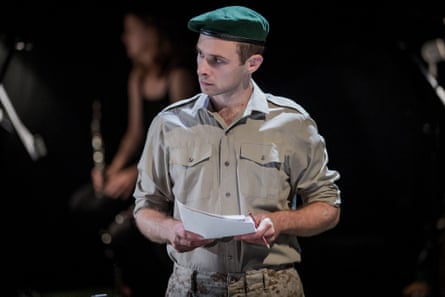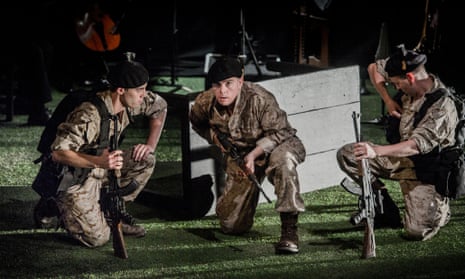Now in his early 30s, Luke Styles recently completed a three-year stint as Glyndebourne’s Young Composer in Residence, whose final product – following a previous chamber opera and two youth operas – is this setting of a reduced version of Shakespeare’s play, turned into a libretto by Ted Huffman, who also directs this initial staging.
The source might seem a bold choice, and the treatment is also audacious. The 12-strong cast is all-male, reflecting not only the theatrical practice of Shakespeare’s time but also, says the composer, creating “a distinct and clear soundworld that heightens the strangeness that draws me to the theatre of opera”.
Styles’s score runs to around 75 minutes without a break, necessitating substantial cuts to the familiar text, including some of Macbeth’s soliloquising, Lady Macbeth’s sleepwalking, and the witches, as well as some reordering and reallocation of lines from one character to another. The ending is startling if enigmatic; the two creators envision the possibility of expanding the current version into a full-length piece.

Scored for 12-piece ensemble, represented here by members of the London Philharmonic under the emphatic baton of conductor Jeremy Bines, the orchestral writing is crisp and incisive, conjuring up with imagination the successive atmospheres required for the tragedy’s trajectory.
Poised in the grey area between recitative and arioso, the vocal writing, which sets large portions of Shakespeare’s text verbatim, is less memorable: instead of defining the individuality of the characters, it feels generic. Given the contemporary combat fatigues and green berets sported by most of the cast in Kitty Callister’s designs, visual identity could be sharper, too.
Yet there’s genuine achievement in the best portions of the piece, and notable contributions from Ed Ballard’s nervy Macbeth, Aidan Coburn’s phlegmatic Lady Macbeth and Alessandro Fisher’s forthright Banquo.

Comments (…)
Sign in or create your Guardian account to join the discussion